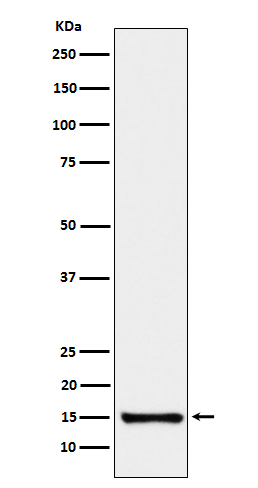
| WB | 咨询技术 | Human,Mouse,Rat |
| IF | 咨询技术 | Human,Mouse,Rat |
| IHC | IHC:1/100-1/200;IHF:1/50-1/200 | Human,Mouse,Rat |
| ICC | 1/50-1/200 | Human,Mouse,Rat |
| FCM | 1/20-1/100 | Human,Mouse,Rat |
| Elisa | 咨询技术 | Human,Mouse,Rat |
| Aliases | CSAA; Saa4;;Serum amyloid A4 |
| WB Predicted band size | 15 kDa |
| Host/Isotype | Rabbit IgG |
| Antibody Type | Primary antibody |
| Storage | Store at 4°C short term. Aliquot and store at -20°C long term. Avoid freeze/thaw cycles. |
| Species Reactivity | Human |
| Immunogen | A synthesized peptide derived from human Serum amyloid A4 |
| Formulation | Purified antibody in PBS with 0.05% sodium azide,0.05% BSA and 50% glycerol. |
+ +
以下是关于SAA4抗体的3篇参考文献概述,按文献发表时间排序:
---
1. **文献名称**: *"Serum amyloid A4 is a procoagulant by bridging factor XI and platelets"*
**作者**: Yamada S. et al. (2021)
**摘要**: 该研究通过SAA4特异性抗体发现,SAA4在炎症反应中通过与凝血因子XI和血小板结合,促进血栓形成,揭示了其在血栓性疾病中的潜在作用机制。
---
2. **文献名称**: *"Differential expression of serum amyloid A4 in human colorectal cancer"*
**作者**: Kim H. et al. (2018)
**摘要**: 研究利用抗SAA4抗体进行免疫组化和ELISA检测,发现结直肠癌患者肿瘤组织和血清中SAA4水平显著升高,提示其可能作为癌症诊断或预后的生物标志物。
---
3. **文献名称**: *"Development of a monoclonal antibody specific for serum amyloid A4 (SAA4) and its application in immunoassays"*
**作者**: Liang Q. et al. (2015)
**摘要**: 该团队成功制备了高特异性的SAA4单克隆抗体,并基于此建立了灵敏的ELISA检测方法,为SAA4在炎症和代谢性疾病中的定量分析提供了工具。
---
如需具体文献链接或补充更多研究,可进一步说明。
The serum amyloid A4 (SAA4) antibody targets SAA4. a constitutively expressed member of the serum amyloid A (SAA) protein family. Unlike acute-phase SAAs (SAA1/SAA2), which are dramatically upregulated during inflammation, SAA4 is produced at lower, steady levels, primarily in the liver, and is associated with high-density lipoprotein (HDL) particles. SAA4 is implicated in lipid metabolism, immune modulation, and cellular signaling, though its exact physiological roles remain less defined compared to its acute-phase counterparts.
Antibodies against SAA4 serve as critical tools for detecting and quantifying the protein in research and diagnostic contexts. They are used to investigate SAA4’s potential involvement in chronic inflammatory diseases (e.g., atherosclerosis, rheumatoid arthritis) and amyloidosis, where misfolded SAA proteins accumulate. Commercially available SAA4 antibodies are typically polyclonal or monoclonal, validated for techniques like Western blotting, ELISA, or immunohistochemistry. Recent studies also explore SAA4’s dual role as a biomarker—its stable expression may reflect metabolic or low-grade inflammatory states, while its altered levels in certain cancers or neurodegenerative disorders hint at diagnostic or therapeutic potential. However, cross-reactivity with other SAA isoforms remains a technical challenge, requiring rigorous antibody validation. Overall, SAA4 antibodies continue to advance understanding of this understudied protein’s biological and pathological significance.
×